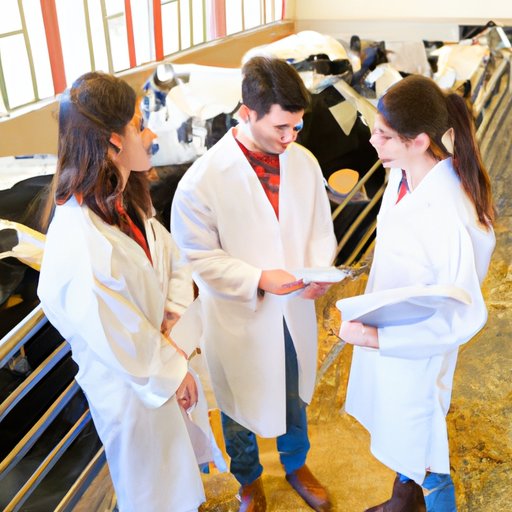Introduction
Animal science is the study of animals and their relationship to humans and the environment. It is a broad field that encompasses many different disciplines, including biology, genetics, nutrition, physiology, ecology, and management. Animal scientists are involved in researching, developing, and managing animal-related products and services, such as livestock production, veterinary medicine, and food production. Earning a degree in animal science can open up a variety of career opportunities and provide graduates with a host of benefits. In this article, we will explore the job prospects for animal science majors, investigate the benefits of earning a degree in this field, discuss the different career paths available, and compare the cost of attending an animal science program to other majors.

Examining the Job Prospects for Animal Science Majors
According to the United States Bureau of Labor Statistics (BLS), employment of animal scientists is projected to grow 4 percent from 2019 to 2029, which is about as fast as the average for all occupations. The BLS also reports that the median annual wage for animal scientists was $62,920 in May 2019. Additionally, the National Association of Colleges and Employers (NACE) found that animal science majors earned an average starting salary of $41,400 in 2020, which is higher than the average starting salary across all majors.
There are many types of jobs available to those with an animal science degree, ranging from research and veterinary medicine to livestock management and food production. According to the American Society of Animal Science (ASAS), animal scientists are employed in a variety of settings, including private industry, government agencies, universities, zoos, and aquariums. Animal scientists may also find employment in consulting firms or biotechnology companies.

Exploring Salaries and Benefits of Animal Science Careers
The salaries and benefits of animal science careers vary depending on the type of job and employer. According to PayScale, veterinarians earn an average salary of $87,737 per year, while animal scientists earn an average salary of $57,917 per year. Animal scientists working in research and development may earn an average salary of $67,000 per year, while those working in education and training may earn an average salary of $53,000 per year.
In addition to salary, many employers offer benefits such as health insurance, retirement plans, paid vacation, and tuition assistance. Some employers may also offer discounts on products or services related to animal care, such as pet supplies or veterinary care.
Exploring the Academic Requirements of an Animal Science Degree
In order to enter an animal science program, students must have a high school diploma or equivalent and meet any pre-requisites required by the college or university. Most programs require at least one year of biology, chemistry, or physics and some may also require math or statistics. Depending on the program, students may also need to complete additional courses in anatomy, physiology, genetics, nutrition, and animal behavior.
Most animal science degrees require four years to complete, though some universities offer accelerated programs that can be completed in three years. Many universities also offer online programs, allowing students to complete their coursework remotely. Additionally, some colleges offer specialized programs such as wildlife management, animal behavior, or equine science.
Investigating the Benefits of Earning a Degree in Animal Science
Earning a degree in animal science provides a number of benefits, including improved career opportunities, increased earnings potential, and professional recognition. Animal science graduates often find employment in fields such as veterinary medicine, research, livestock management, food production, and education.
Graduates of animal science programs may also find themselves in high demand due to their specialized knowledge and skills. According to the ASAS, “animal scientists are highly sought after by employers due to their expertise in animal behavior, nutrition, genetics, and physiology.” Furthermore, many employers offer competitive salaries and benefits for animal science graduates.
Additionally, a degree in animal science may provide graduates with professional recognition. According to the ASAS, “animal scientists are widely respected by employers and peers due to their comprehensive understanding of animal science and its applications.”
Discussing the Different Career Paths Available to Animal Science Graduates
Animal science graduates have a variety of career options available to them. Veterinary medicine is one of the most popular paths for animal science majors, as it allows them to use their knowledge and skills to diagnose and treat animals. Research is another popular career option, as animal scientists are often employed by universities and government agencies to conduct research on animal behavior, nutrition, genetics, and physiology.
Other career paths available to animal science graduates include livestock management, food production, and education. Livestock managers are responsible for overseeing the breeding and care of livestock, while food production professionals develop new products and processes related to animal agriculture. Animal science graduates may also find employment in education, either teaching in K-12 classrooms or conducting research at the university level.

Comparing the Cost of Attending an Animal Science Program to Other Majors
The cost of attending an animal science program varies depending on the school and the type of program. Tuition costs for animal science programs are typically comparable to other science majors, such as biology or chemistry. Additionally, many universities offer financial aid and scholarships for animal science majors.
Living expenses, such as housing and meals, are typically lower for animal science majors than for other majors, as most animal science programs do not require students to live on campus. Finally, some schools may require additional fees for lab or field trips, but these fees are typically lower than those charged by other programs.
Conclusion
An animal science degree provides graduates with a wide range of career opportunities and benefits, including improved job prospects, increased earnings potential, and professional recognition. Animal science majors have the opportunity to pursue a variety of career paths, including veterinary medicine, research, livestock management, food production, and education. Furthermore, the cost of attending an animal science program is typically comparable to other science majors.
For those interested in pursuing a career in animal science, there are many resources available to help guide them on their journey. From exploring the job prospects and academic requirements to comparing the cost of attending an animal science program to other majors, this article has provided an overview of the benefits of an animal science degree and encouraged prospective students to pursue their dreams.
(Note: Is this article not meeting your expectations? Do you have knowledge or insights to share? Unlock new opportunities and expand your reach by joining our authors team. Click Registration to join us and share your expertise with our readers.)
